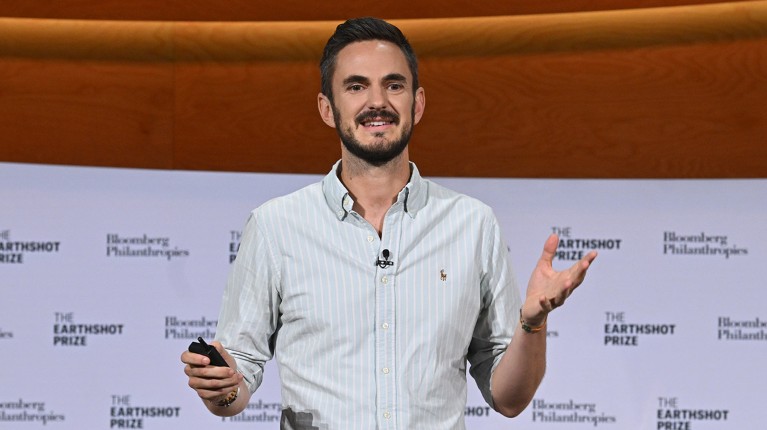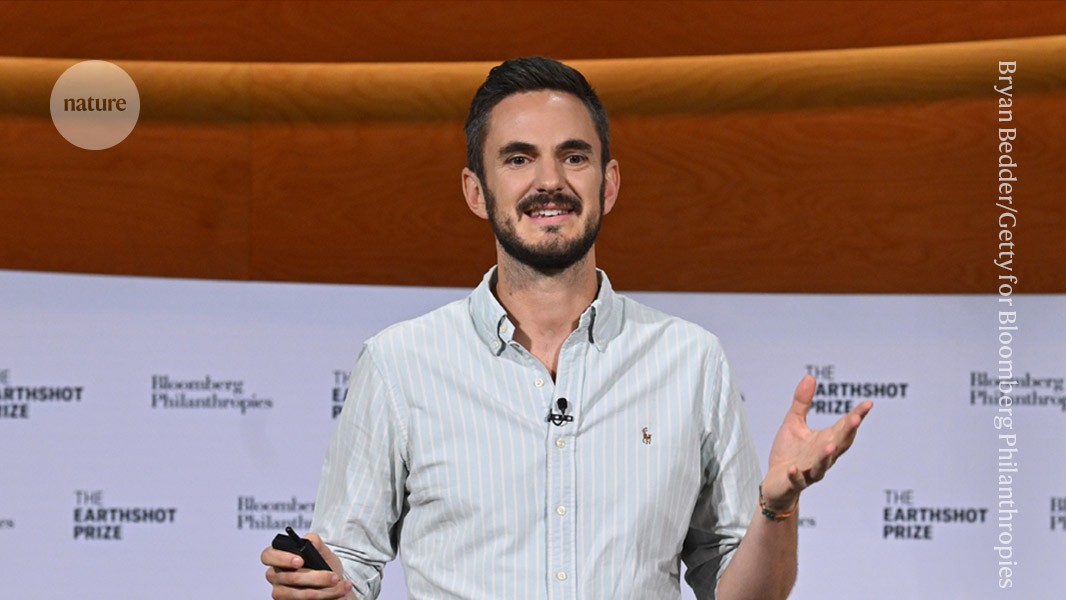
Thomas Crowther made a name for himself after publishing a paper that suggested Earth had eight times more trees than expected.Credit: Bryan Bedder/Getty Images for Bloomberg Philanthropies
A university investigation into Thomas Crowther, a prominent tree researcher who ran a large laboratory at the Swiss Federal Institute of Technology in Zurich (ETH Zurich), reveals that he blurred personal and professional relationships in his lab and breached internal rules on financial and hiring compliance. But it clears him of misusing grant funds.
However, some members of Crowther’s laboratory have accused ETH Zurich of a flawed and biased investigation, in a letter sent to the university on 28 April and seen by Nature, and they call for an independent review into the university’s handling of the case. The investigation led ETH Zurich to decide, in January, that it would not renew Crowther’s contract — a tenure-track professorship — and his lab, which previously employed 40–60 people, is being dismantled.
ETH Zurich published a retracted version of the report on 25 April. It finds that Crowther “repeatedly failed to follow internal rules and adequately address conflicts of interest”, but it does not provide evidence of any misuse of funds, according to Stefan Spiegel, the university’s vice-president of finance and controlling at the institution.
Crowther, who is on administrative leave until his contract expires in September, denies many of the allegations investigated in the report, but admits he made mistakes. “I am deeply sorry if this caused any discomfort for anyone,” Crowther said in a statement to Nature. He never engaged “any form of inappropriate advances”, he adds.
The university confirmed to Nature that it had received the lab members’ letter. “From ETH Zurich’s perspective, the case is considered closed” with the publication of the report, it said in a statement. “The President of ETH Zurich had already concluded in December 2024 that the basis of trust required for a permanent position was not given in this case.”
Rising star
Crowther rose to prominence after publishing a Nature paper1 in 2015 that suggested that Earth had eight times more trees than expected. His work garnered interest from influential people, including US President Donald Trump, and inspired a high-profile tree-conservation initiative by the World Economic Forum.
Crowther has been at ETH Zurich since 2017, but in late 2024, Swiss media reported that several people had made allegations against him to the university.
The report into these allegations, investigated in 2024 and 2025 by a law firm appointed by ETH Zurich, reveals that among the documents examined were five individuals’ written statements and a whistle-blowing report on possible compliance issues.
The investigation says that Crowther treated “his employees in the same way as friends”. Although most employees appreciated his behaviour, the report says, others thought it was inappropriate and said he crossed personal boundaries. Examples of this reported behaviour included late-night WhatsApp messages inviting employees to parties. Some described a “toxic management culture”.
In a statement to Nature, Crowther admits that he blurred the lines between personal and professional life, and treated employees as close friends. “I am devastated that it did not work for some. I will always strive to improve,” he says.
Financial matters
For some of the more serious allegations, such as that Crowther kissed a former lab intern and invited a student to his apartment after dinner, the institution said it received information during the investigation that contradicts the accusers’ versions of events.
Crowther added: “I would never ever initiate any form of intimate interaction with a student. I am grateful that the ETH investigation uncovered clear evidence to contradict these accusations.”
On financial and legal matters, the probe investigated several allegations, including that lab members worked for other organizations during their contracted hours and that the lab misused consultancy contracts.
The report finds that in certain cases, such as spending on crisis communications, legal advice and marketing, and the use of consultancy contacts, the rules were not always followed. Crowther acknowledged a “few minor oversights” relating to spending on crisis communication and legal advice, but denies that consultancy contracts were misused.
Crowther says that his lab was huge, with “countless contracts and collaborations”. “I know that I will have made some accidental errors. But I can guarantee that no lab members worked for other organizations during their employment at ETH,” he adds.
Overall, the report concludes that Crowther conducted his research to a high level, but “failed to live up to the responsibility expected of him”.


